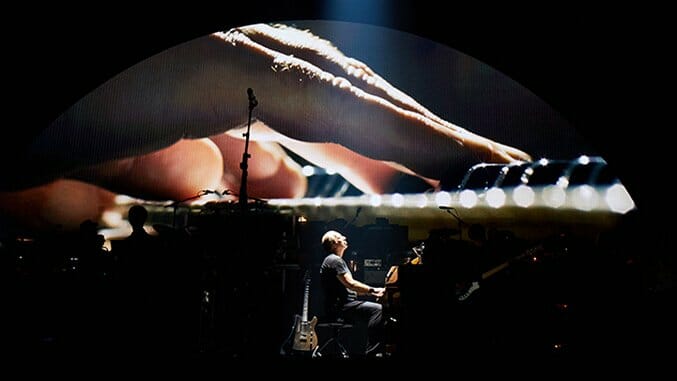Just Call It Music: Hans Zimmer Takes His Scores on Tour
Photo: Suzanne Teresa
If you’ve watched a lot of blockbuster-type movies in the last few decades, chances are you’ve experienced the music of German-born composer Hans Zimmer. He’s scored over 120 films—from those of The Dark Knight Trilogy to Gladiator—in various genres; next up is Christopher Nolan’s Dunkirk.
However, about three years ago, Zimmer decided to step out from behind the screen and perform his music in front of audiences around the world. Earlier this year he played his first U.S. concerts, including a much raved-about performance at Coachella.
Zimmer’s live performance features two distinct sections: The first showcases some of Zimmer’s classic movie scores, including those for The Lion King and Pirates of the Caribbean, while the second part re-imagines versions of music from films like The Dark Knight and Inception. The latter often includes special guest musicians, invited to join Zimmer and his bandmates.
The composer recently wrapped up a European tour, and will return to the states for a month-long stint, starting July 13 in Dallas, before crisscrossing the country and finishing in Santa Barbara on August 13.
Paste recently caught up with Zimmer by phone from his final European stop in Milan to discuss what’s it like taking his music on the road and what keeps him going after all these years.
Paste Magazine: Earlier this year you expressed your amazement at how the Coachella set went. How are you feeling about the live show now?
Hans Zimmer: Still amazed. [There]’s a big difference between doing a movie as opposed to the live show—every show is different. The problem, of course, is that I have a band that is very musically ambitious and adventurous. So, you never quite know what you’re going to get every night. They’re spending their time at the edge of the abyss, with myself hanging on for dear life. Like “Are we going to make it through the next track?” So, it’s not getting boring, if that’s what you mean.
Paste : You’ve mentioned in the video promo for your MasterClass sessions that with your music you’re basically having a conversation with your audience. How does that convert to the live setting?
Zimmer: It’s the truest version of that statement. Because real time is very different from hiding behind the screen during things. It’s not in real time. You react obviously to what your audience is putting out. So, in a peculiar way, it’s almost like playing a duet. It’s between the audience and you. The audience is absolutely part of the performance. Basically, it’s a completely different way for me to look at music.
Paste : You also said that, “If somebody tells you that there’s a rule, break it, that’s the only thing that moves things forward.” Can you expand on that statement?
Zimmer: It’s not so much breaking [rules] as opposed to constantly evolving things and moving boundaries aside and building bridges. The constant idea is to invent and never stand still. In a funny way, you have to be virtually completely passé and oblivious that there are any rules. The most fun I’ve had—I haven’t really thought about it most times—was starting a score and going, “Well there is a set way of doing this.” Even just harmonically and just with music. There are certain rules. Let’s figure out what the biggest no-no is and just see if we can make something really beautiful or great or exciting out of that. So as soon as someone tells me a rule, I somehow feel challenged by that to go prove them wrong.
Like playing film music at a festival like Coachella. Even I had my doubts, let’s be honest. But you know what I suddenly figured out? One of the rules that we all live by, including myself, was there are different forms of music—there’s rock music, there’s pop rock and heavy metal, and then there’s film music. [But] it’s all [just] music. It doesn’t matter [what genre it is]. I think the audience was surprised. But I think I was more surprised than the audience, quite honestly. I think the audience came to Coachella with more faith in what I was going to do than I was having about the whole thing. And it turned out it was just music. It was like any other music. It was either good music or bad music. It takes you on a journey or it doesn’t. If anything good came out of Coachella, [it] was to stop putting film music into its own little pigeonhole of a box. Just call it music.
Paste: Do you hope you’re a trendsetter for composers with touring like you are currently?
Zimmer: No, I don’t hope to be a trendsetter for anybody. I want everyone else to be their very own trendsetter. My friend is going to go out and do some shows. But they’ll be very different from mine. That’s sort of the great thing. You need to go and do something that everyone told you shouldn’t do. And you either pull it off or you don’t pull it off. In that case, it was a successful experiment [for me]. I don’t want to be a trendsetter because I love that other people are [touring] in a completely different way. I would never want to take away from the pleasure of seeing a John Williams concert, who does it in a completely different way.
Part of the problem with [being a] trendsetter is you try to be relevant. Or slightly ahead of the curve. And trendsetters have a nasty habit of trends growing boring and unfashionable and the trend dying very quickly. I’ve never tried to be a trendsetter or fashionable in any way. I just stick to writing my music that I like enough, and that I was hoping other people would like a lot too.